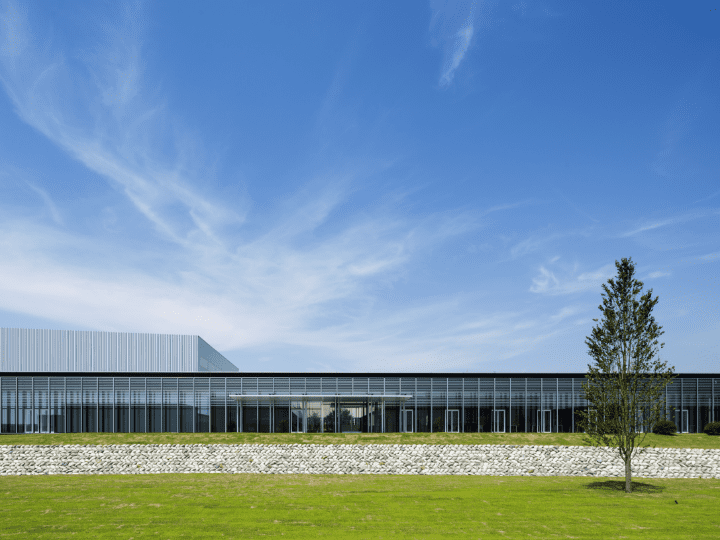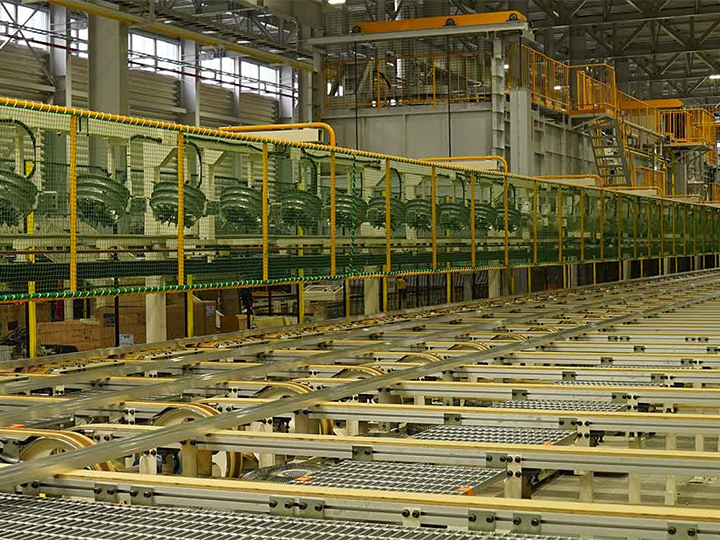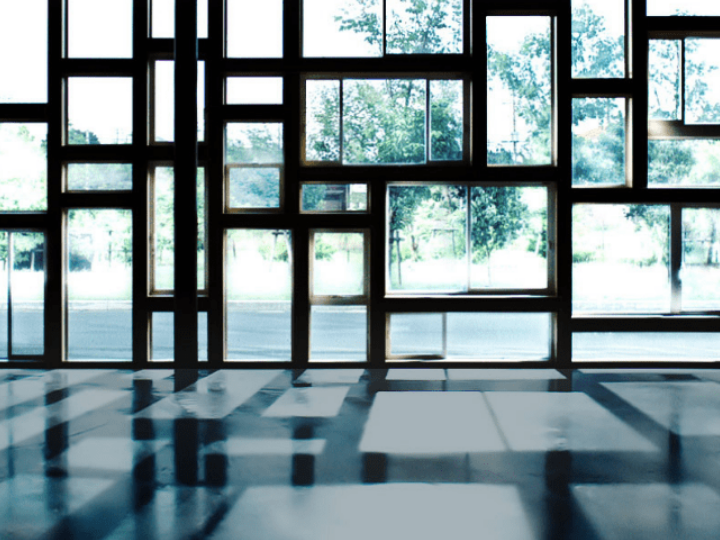
An integrated production system: a commitment to manufacturing that pays attention to even a single screw
YKK AP's strength lies in its "integrated production system," which encompasses everything from materials, components, and production equipment to processing and assembly. Even screws are produced in-house. We would like to introduce YKK AP's integrated production system, and the passion that YKK AP employees have for monozukuri, paying attention to even a single screw.
Table of Contents
- An integrated production system: In-house production, from materials to parts and production facilities
- Achieving shortened installation time by improving “wood screws”
- The meaning of making screws in-house: employees' feelings, poured into a single screw
- Optimal solutions that can be derived only from an integrated production system
- Through 100% inspection, no defects are overlooked—even in a single screw
- “Even if it's only one screw, it still matters.” YKK AP's feelings, poured into a single screw
An integrated production system: In-house production, from materials to parts and production facilities
YKK AP's products consist of various parts such as aluminum and plastic frames, glass, screens, and functional parts. All of these manufacturing processes are done in an integrated manner at our own manufacturing locations.
Glass used for products such as windows—our mainstay products—is purchased in sheets of rough glass, then processed in-house into Low-E glass and triple-glazed glass. In addition, we process everything in-house, from melting ore for aluminum materials and blending raw materials for plastic materials.
For components that are arguably vital for our products, we produce metal and plastic functional parts—such as door rollers, screws, and screen netting—based on our technological development capabilities, including elemental technologies. There are also various testing and assessment functions which we perform for further quality assurance.
In addition, the development and manufacturing of specialized equipment for production is handled by our own department, called Machinery & Engineering. The seamless and rapid collaboration between Machinery & Engineering and the development and manufacturing divisions make our technological competitiveness even greater.
We believe that our commitment to integrated production enables speedy technological development, cost adjustment throughout the supply chain, and reliable quality assurance.

The cornerstone of YKK AP's monozukuri: the Integrated Production System
Achieving shortened installation time by improving “wood screws”
YKK AP's commitment to monozukuri, with its integrated production system, permeates down to a single screw. This is embodied in the improvements we made in 2016 to the wood screws used to install window frames in the building frames of wooden houses. By reviewing the depth of the recessed area in the top of a Phillips head screw, as well as the shape of the thread on the screw tip, we improved the screw's grip on a screwdriver bit, as well as its ability to bite into wood. This made it possible to reduce time spent fastening screws by 30% (according to our own research).

Points of improvement for the wood screw
- We reviewed the depth of the cross-shaped hole in the screw head, and by making the screw's contact with the screwdriver bit deeper than in a conventional screw, it became easier to facilitate transmission of rotational force.
- By reviewing the shape of the thread near the tip of the screw, we improved its ability to bite into wood.
The meaning of making screws in-house: employees' feelings, poured into a single screw
From here, we asked two employees who were involved with the improvement of these wood screws—Mr. Ryohei Sudo, who is Head of the PLM Promotion Department and in charge of development (and who was in charge of window product development at the time), as well as Mr. Suguru Shibata in Manufacturing, who is Head of the Overall Line, Screw Line, Metal Components Manufacturing Section, Kurobe Ekko Plant, Manufacturing Division (and who was in charge of screw production technology at the time)—about the meaning of making screws in-house, and the feelings poured into their commitment to monozukuri, down to a single screw.
Optimal solutions that can be derived only from an integrated production system
(Sudo) Regarding these improvements to wood screws, when we were developing the APSWORD NEO aluminum-vinyl composite window, our core product which launched in April 2017, in an effort to give the screws an advantage as one of the product's many selling points, we improved them by moving to wood screws which would be easier to work with than existing ones.
To begin with, the screws are in accordance with JIS, and meeting these standards guarantees a certain level of quality. However, when we thought whether that was really all there was to it, we decided not to be satisfied with JIS, but to start working on improvements with the desire to create a better product.
First, we thoroughly investigated factors such as the screw thread shape, the state of the paint, and the sharpness of the tip. Development and manufacturing brought together knowledge and technology to improve the screw.

(Left) Mr. Sudo (Right) A window product using the wood screws
Furthermore, YKK AP has all kinds of specialized departments within the company—including the Value Verification Center, which handles the evaluation and verification that is essential for product development and the provision of new product value—and a department specializing in studies and analysis. With the cooperation of these departments, we were able to bring the improvements to fruition in a short period of about three months before mass production began. We believe that we were able to proceed with such speed because of the environment in which a variety of in-house experts—from departments such as development, manufacturing, quality, evaluation and verification, and studies and analysis—were able to work together in close proximity. I believe that would not have been the case if we had gone through an external vendor.

Value Verification Center
Furthermore, I could also say the same thing about quality and cost. No matter how high the quality or how easy they are to work with, screws should not be designed to be costly or difficult to produce in the manufacturing process. In the end, product quality is something that the customer decides (for wood screws, the installation vendor). We were able to derive the optimum solution by involving every specialized department within the company, which included making comparisons with other companies and objective assessments, from the design stage. I believe we excel at this because of our integrated production system.
(Shibata) I was involved with improving wood screws in my capacity as the employee in charge of production technology. Looking back on those days, I remember that we actually drove in the screws ourselves with the members of the development team to experience how good or bad they were to work with. After understanding the intended use of the product, we had close conversations such as, "We need these characteristics, so let's improve them in this way," or "Let's change how we make them."
Screws can generally be procured even from outside vendors. But it is not possible to find the screws we really want in the market. We were able to create the wood screws that we wanted because we fully understand the characteristics of the product, with manufacturing and development working together. I realized once again that this is exactly what it means to make screws in-house.
Through 100% inspection, no defects are overlooked—even in a single screw
(Shibata) We are also pursuing thorough quality at the manufacturing site. The Screw Line, which is solely responsible for manufacturing screws for YKK AP, manufactures and ships as many as 600 million screws over the course of a year. When manufacturing such huge quantities of screws, spot checks are common. However, starting in 2017, we introduced 100% inspections at YKK AP, with a strong desire not to produce a single defective product. This inspection consists of image inspection of screws using high-speed cameras and automated bagging. In addition to removing defects, we can also prevent the mixing of screws with different part numbers by conducting inspections of every screw and bagging them in a consolidated way.

(Left) Mr. Shibata (Right) Adjusting the device for 100% inspection
There were many people involved in the design stage of the screw, and a great deal of technology was packed into its design. The introduction of this 100% inspection system was made possible by the desire of our employees to "focus on each and every screw, so as not to waste this technology."
This device can be used in ways such as obtaining data from defective products, which also allows us to check phenomena which cause defects and leads to improvements.

Screws that have been individually crafted with skill and care during the manufacturing process
“Even if it's only one screw, it still matters.” YKK AP's feelings, poured into a single screw
(Sudo) Compared to other functional parts, the screw looks plain. Among many components, it may be small and have little presence. However, even if it's only one screw, it still matters. Without screws, products cannot be assembled, and they are indispensable in ensuring product performance. In particular, wood screws are used by installation vendors when installing windows in wood houses, and there are approximately 700 such screws* per single family home. If they are hard to work with, this could undermine confidence in our products and, ultimately, in our company. We worked on this design with a keen awareness that making our products easier to work with is one of the factors that differentiates us from our competitors. I believe that YKK AP's monozukuri is not only about pursuing the best products, but also the best screws.
(Shibata) From our point of view as a manufacturer, a single screw may be one of the 600 million screws we manufacture every year, but it is certainly an important one for the customer who uses it. We will continue to pursue manufacturing with this kept firmly in mind.
*Example of calculations based on a model plan with 18 windows per single family home.

Ryohei Sudo
Joined the company in 1999. Mainly in charge of product development. Since FY2017, has been in charge of new development process (ECM) reconstruction in the Operation Division. Has promoted the establishment of product lifecycle management (PLM) infrastructure in his current position since FY2021.

Suguru Shibata
Joined the company in 2007. In charge of screw production technology. Has held his current position since 2019, overseeing and managing the manufacturing of screws on the Screw Line.
Share this article
- SNS Link X X Share
- SNS Link Facebook Facebook Share
- SNS Link LinkedIn LinkedIn Share
- SNS Link LINE LINE Share
- Copy Link Copy Link Copy Link Copied Link
Related stories
-

The Evolution of the Aluminum Profile Department into the Automotive Industry’s Manufacturer of Choice
- Aluminum Profile
- Technology
- Sustainability
- Solving Social Issues
-

Toward Achieving Carbon Neutrality: Taking on the Challenge of 100% Aluminum Recycling by a Window Manufacturer
- Technology
- Manufacturing
- Environment
- Sustainability
-

Stop the Landfill Disposal of Used Vinyl Windows! Disseminating Vision for Vinyl Window Recycling Through Industry-Government-Academia Collaboration, and Taking on the Challenge of "Window-to-Window" Recycling
- Technology
- Manufacturing
- Environment
- Solving Social Issues








